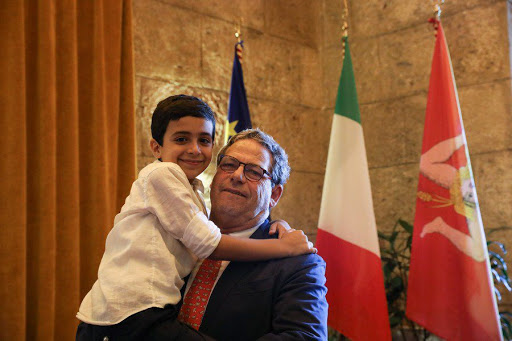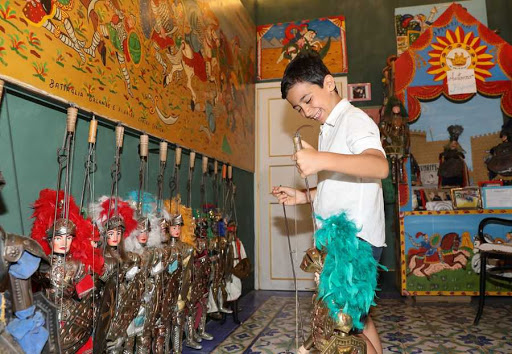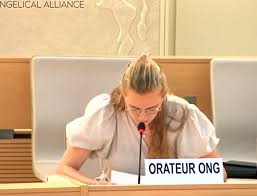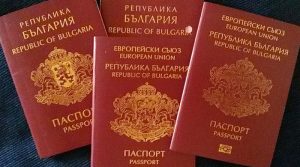Will never ever forget the warm hug with Chinese President Xi, Italian boy

Beijing: Antonio Tancredi Cadili, a nine-year-old Italian boy, is a big fan of puppet theater, a time-honored form of entertainment in his hometown, the Mediterranean island of Sicily.

Among his favorite puppet operas is the epic romance of “the Madness of Orlando.” Since he found out that the fair princess in the war and love story, Angelica, was from China, he could not help thinking about the ancient country in the East.
When he came to know that Chinese President Xi Jinping would travel to Sicily during a state visit to Italy in March 2019, an idea popped up in his mind: how about a puppetry performance for the leader of China? He proposed it to Gianfranco Micciche, president of the Sicilian Regional Assembly, and, to his excitement, got the green light.
“I couldn’t wait to see him,” said the boy. He tried hard to picture how his encounter with Xi would be like. Yet what happened went far beyond what he had imagined.
In the medieval opera, Orlando, one of Charlemagne’s paladins, lost his sanity after his beloved princess Angelica from Cathay, a poetic name for China, was married to Saracen knight Medoro. Like a furious beast, Orlando tore off his armor and threw away his sword.
That was the episode Antonio performed for Xi and his wife, Peng Liyuan, at Palazzo dei Normanni, one of the oldest royal residencies in Europe and now the seat of the regional assembly. He had rehearsed repeatedly for the show.
The ardent fan of the Opera dei Pupi, or the Opera of the Puppets, owns a collection of some 40 puppets from Catania and Palermo, two different schools of puppetry in Sicily.
To Antonio, the puppets are like brothers. The boy would sit down with them on the floor and talk about his day at school.
The performance for the Chinese president was a big success. And to the boy’s surprise, the Chinese president gave him a hug. It was so warm that it felt like one between two old friends meeting again after a long time, Antonio recalled.
Antonio remembered Xi and Peng as people with “big hearts.” “They really made an impression on me, especially because of their kindness,” said the boy.
To eternalize this encounter, Antonio, who had been learning piano for one and a half years, composed a melody and named it “The Hug.” “I will never ever forget it,” he said.
In Micciche’s memory, Antonio’s puppetry show turned out to be one of the most memorable moments of Xi’s trip to Sicily. As part of the message that the cultural link between Sicily and China has existed for centuries, it gave a glimpse of the intercivilizational interaction between Italy and China.
Sicily, located in the central Mediterranean Sea and an important hub on the ancient Silk Road trade routes connecting the East and the West, enjoys a long history of exchanges with China.
It was through a Sicilian Jesuit missionary that many Europeans learned about Confucianism. During the 17th century, Prospero Intorcetta, known to the Chinese as Yin Duoze, compiled an influential Latin overview of the Chinese history and published Latin translations of some Chinese classics.
The cultural connections between Sicily and China are what Micciche treasures most. “These are the most exciting and important things,” he said.
In Palazzo dei Normanni, Micciche accompanied Xi and Peng on a visit to the Arab-Norman-Byzantine style Cappella Palatina, which is an epitome of the island region itself, a melting pot of Eastern and Western cultures.
They showed a great interest in the cultural elements of the chapel, recalled Micciche, noting that Peng was so attracted to it that she walked away from the delegation for a while to have a more thorough look.
The Sicilian official said the Chinese couple impressed him not only with their cultural and historical knowledge, but also with their geniality.
“If I can feel so much at ease in front of such important people, it is their merit,” he said.
Antonio said he is now a fan of Chinese puppetry. He found this new love in late November when he was in China’s southeastern city of Quanzhou in Fujian Province for an international puppet festival.
In his encounter with Xi, the president told him that a puppetry tradition like the Opera dei Pupi also exists in Fujian and invited him to the province.
Chinese puppets have more strings than Sicilian ones which normally have two to four, thus they are harder to operate, the boy said.
Yet the boy’s trip to Quanzhou, an important port at the East end of the Silk Road, testifies to a trend in China-Italy ties that goes far beyond puppetry.
Before arriving in Sicily, Xi and Italian Prime Minister Giuseppe Conte witnessed in Rome the signing of a memorandum of understanding (MoU) on bilateral cooperation within the framework of the Belt and Road Initiative (BRI).
Along with the MoU, Beijing and Rome also inked an agreement to import Sicilian oranges.
Pointing to Sicily’s geographic advantages in the BRI cooperation, Mayor Leoluca Orlando of the Sicilian capital of Palermo said that with Xi’s visit, the region is poised to become the BRI’s gateway to the Mediterranean.
That visit, said the mayor, has created a historical opportunity for Sicily to strengthen trade and tourism ties with the world’s second largest economy.
The catalytic effect is already being felt. According to Micciche, the number of Chinese visitors surged to 10 percent of the island’s total just one month after Xi’s visit.
The Chinese tourists “have begun to ask the whereabouts of the palace their president visited,” Micciche said.





